Key takeaways:
- Religious education fosters empathy and curiosity, allowing individuals to reflect on their own beliefs through engaging with diverse faiths.
- Studying world religions promotes critical thinking and helps cultivate respect for different cultures, aiding personal growth and understanding.
- Active listening and immersion in cultural practices enhance comprehension of various faiths, revealing shared human values despite differences.
- Interfaith dialogue deepens connections and fosters empathy, emphasizing the importance of vulnerability and shared experiences in building understanding.
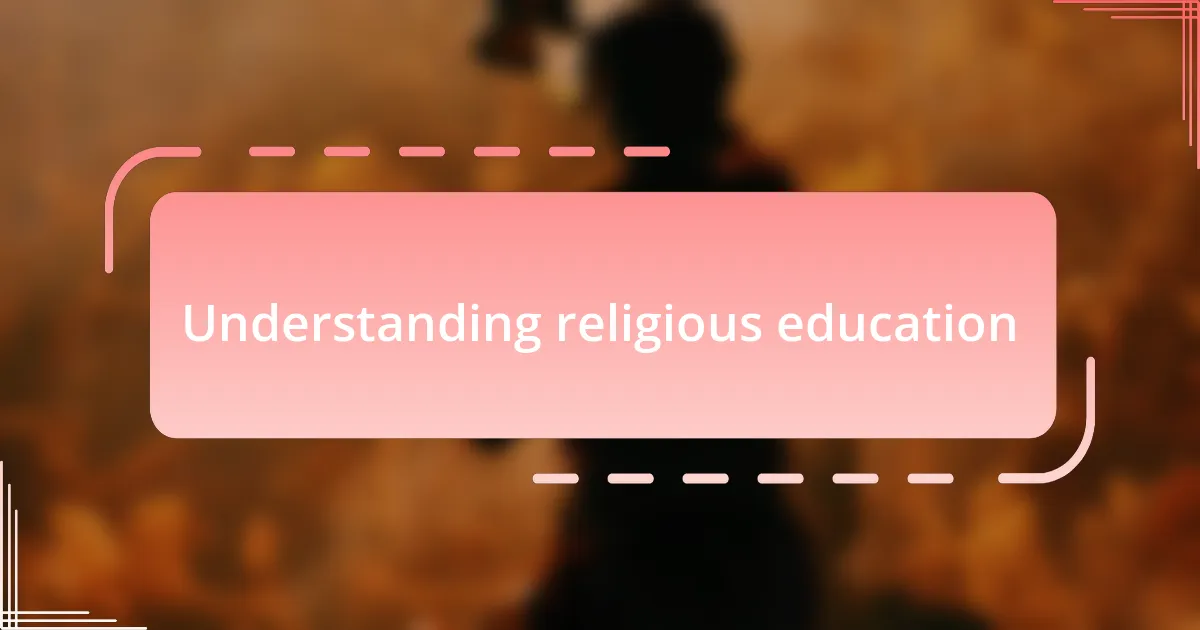
Understanding religious education
Understanding religious education is more than just learning about different beliefs; it involves grappling with the core values that shape individuals and communities. I vividly remember my first religious class, where the teacher shared stories from various faiths. It struck me how similar the foundational messages were, despite the surface differences. Isn’t it fascinating how a simple story can bridge apparent divides?
As I delved deeper into religious education, I realized it’s a journey of empathy and curiosity. Engaging with texts from other traditions often made me question my own beliefs. For instance, reading about compassion in Buddhism prompted me to reflect on how I practiced kindness in my daily life. Have you ever felt your perspective shift after learning something new?
The emotional layer in understanding religious education cannot be overlooked. Encountering heartfelt narratives from individuals of diverse faiths helped me appreciate their struggles and triumphs. I remember hearing a firsthand account of faith providing hope amidst adversity; it made me reflect on the role of belief in my own challenges. Doesn’t it make you wonder how our personal stories intertwine with those of others, regardless of differing backgrounds?
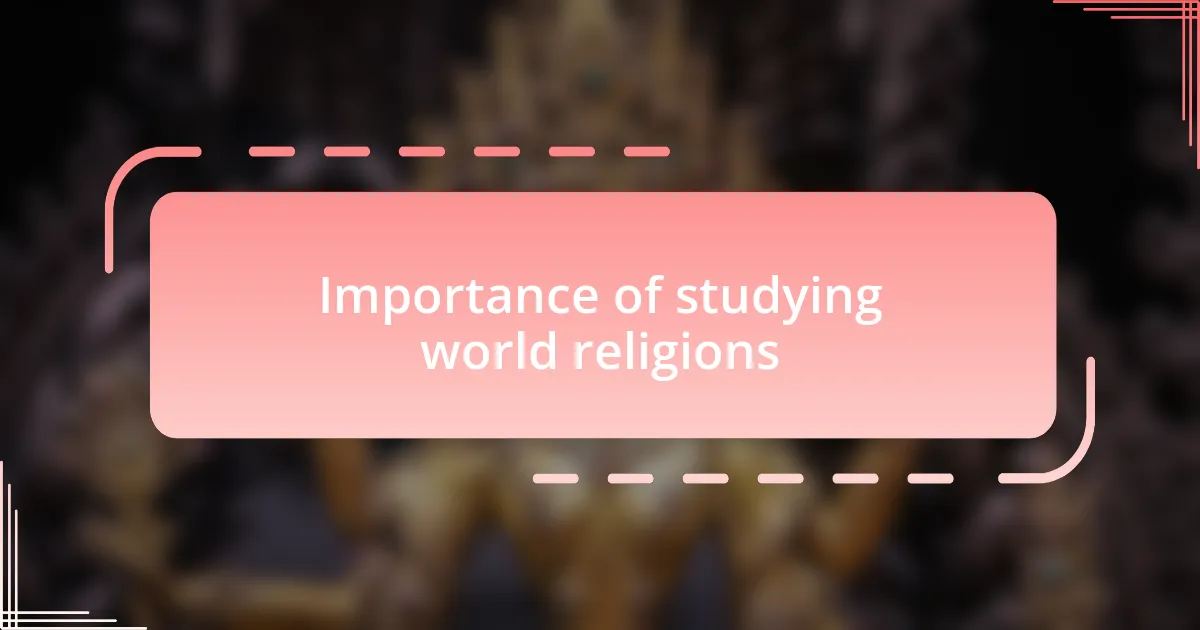
Importance of studying world religions
Studying world religions is crucial because it fosters a deeper understanding of cultures and societies. I recall a time when I attended a panel featuring speakers from various faiths. Hearing their lived experiences opened my eyes to the ways that belief systems guide community values, traditions, and practices. Have you ever considered how religion shapes the world we live in, from art to cuisine?
Moreover, exploring different faiths cultivates empathy and respect. I remember attending a multicultural festival where individuals shared stories about their beliefs with pride. Listening to those narratives created a connection that transcended differences. In this world of increasing division, isn’t it inspiring to think that understanding others can unite us rather than set us apart?
The implications of studying religions extend beyond mere knowledge; it encourages critical thinking and self-reflection. I found myself pondering how my beliefs impact my interactions with others after analyzing ethical teachings from various religions. This reflection not only deepened my faith but also reshaped my approach to daily life. Isn’t it intriguing how examining different perspectives can lead to personal growth?
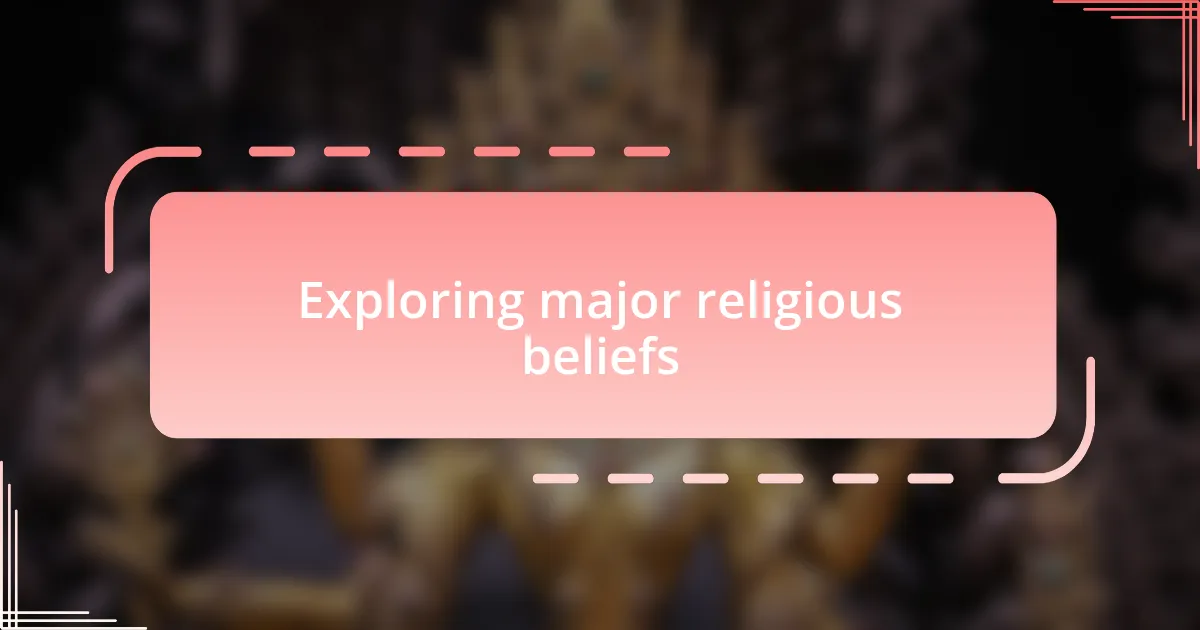
Exploring major religious beliefs
Exploring major religious beliefs reveals not just diverse doctrines but also the common human questions they address. For instance, I once attended a discussion on the afterlife across religions, and it struck me how different faiths articulate hopes and fears about what lies beyond. Have you ever reflected on how a culture’s view of life after death shapes its ethical values and community dynamics?
Consider the roles of rituals in these belief systems, which often serve as a bridge between the sacred and the ordinary. I remember observing a Diwali celebration, where the lighting of lamps symbolized the victory of light over darkness. It made me think—how do rituals in your faith express the deeper truths you hold?
Furthermore, the concept of morality varies significantly among traditions, yet it often springs from a common desire for harmony and justice. I found it fascinating when I delved into the teachings of Buddhism, which emphasizes compassion, and how that resonates with the Golden Rule in Christianity. Isn’t it remarkable how these principles can guide us toward a more peaceful coexistence?
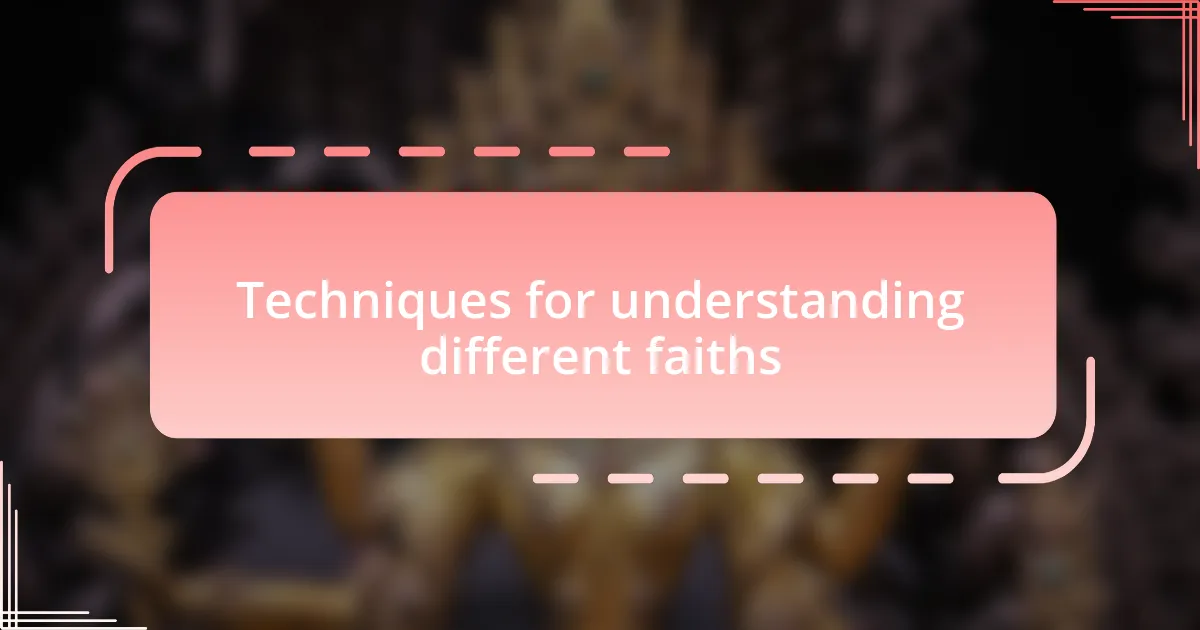
Techniques for understanding different faiths
To truly understand different faiths, I’ve found the practice of active listening to be invaluable. During a community interfaith exchange, I listened intently as individuals shared their beliefs and personal experiences. It was eye-opening; I realized that, when we focus on hearing others, we often discover the threads that connect us despite our differences. Have you ever considered how much you could learn just by allowing someone else to share their story?
Another effective technique is to immerse oneself in the cultural practices associated with different religions. I vividly remember participating in a Ramadan iftar, where we broke fast with friends from a Muslim community. The warmth and sense of togetherness during that meal deepened my appreciation for their faith and its emphasis on community. Can you think of a time when engaging in a different cultural practice enriched your understanding of a religion?
Finally, reading sacred texts from various faiths has profoundly shaped my perspective. When I first picked up the Bhagavad Gita, I was struck by its philosophical depth and universal themes of duty and purpose. Each text offers a unique lens through which to view the world; have you explored how understanding these teachings can foster empathy and compassion in our daily lives?
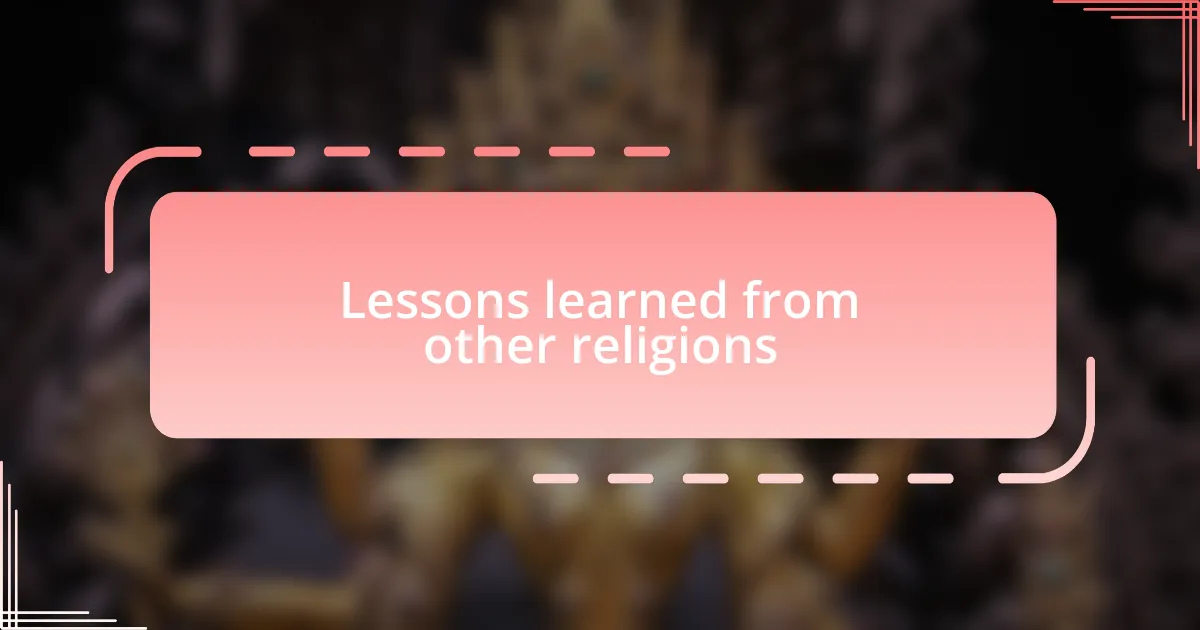
Lessons learned from other religions
Embracing elements from other religions has taught me the value of compassion at its core. For instance, when I volunteered at a local Hindu temple, I observed how seva, or selfless service, was deeply woven into their practices. That gave me a newfound appreciation for the power of helping others, regardless of our differences. Have you ever experienced that sense of connection through acts of kindness in unfamiliar settings?
From studying Buddhism, I learned the significance of mindfulness and the present moment. I recall attending a meditation session that encouraged participants to focus on their breath. It transformed my understanding of stress and helped me appreciate the serenity found in stillness. Have you explored ways that being present can shift your perspective on life’s challenges?
Lastly, the concept of forgiveness in Christianity has resonated deeply with me. I reflect on a time when I had to forgive someone who had wronged me. Learning about the biblical teachings on forgiveness allowed me to let go of resentment and embrace healing. How has the notion of forgiveness influenced your relationships and interactions with others?
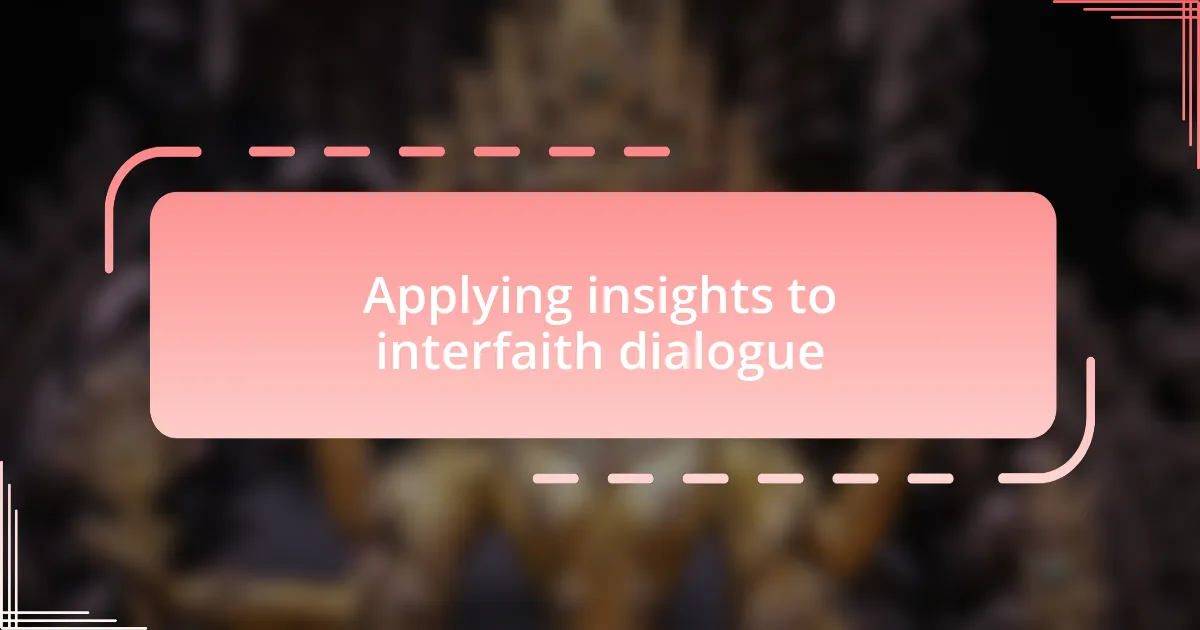
Applying insights to interfaith dialogue
Engaging in interfaith dialogue has been deeply transformative for me. One memorable encounter at an interfaith event involved a spirited discussion about the role of rituals in expressing faith. Listening to a Muslim friend share how Ramadan fosters community and personal reflection made me realize that, despite our contrasting traditions, we all seek belonging and understanding. Have you ever found common ground in unexpected places during discussions about faith?
During another interaction, we explored the concept of love prevalent in different religions. Sharing a powerful moment when a participant spoke about the Farsi poetry of Rumi revealed a poignant truth: love transcends boundaries, weaving connections among diverse beliefs. It struck me that these conversations not only enrich our knowledge but also foster empathy and mutual respect. How do you think sharing such experiences can deepen our commitment to harmony and acceptance?
I’ve also experienced the impact of vulnerability in interfaith dialogue. At one session, I opened up about the challenges of faith in a multicultural world, receiving an outpouring of support and understanding from others. Their willingness to share personal struggles highlighted the universality of our journeys. It made me consider how opening up about our own stories can create a safe space for others to do the same. What role do you think vulnerability plays in nurturing meaningful interfaith conversations?